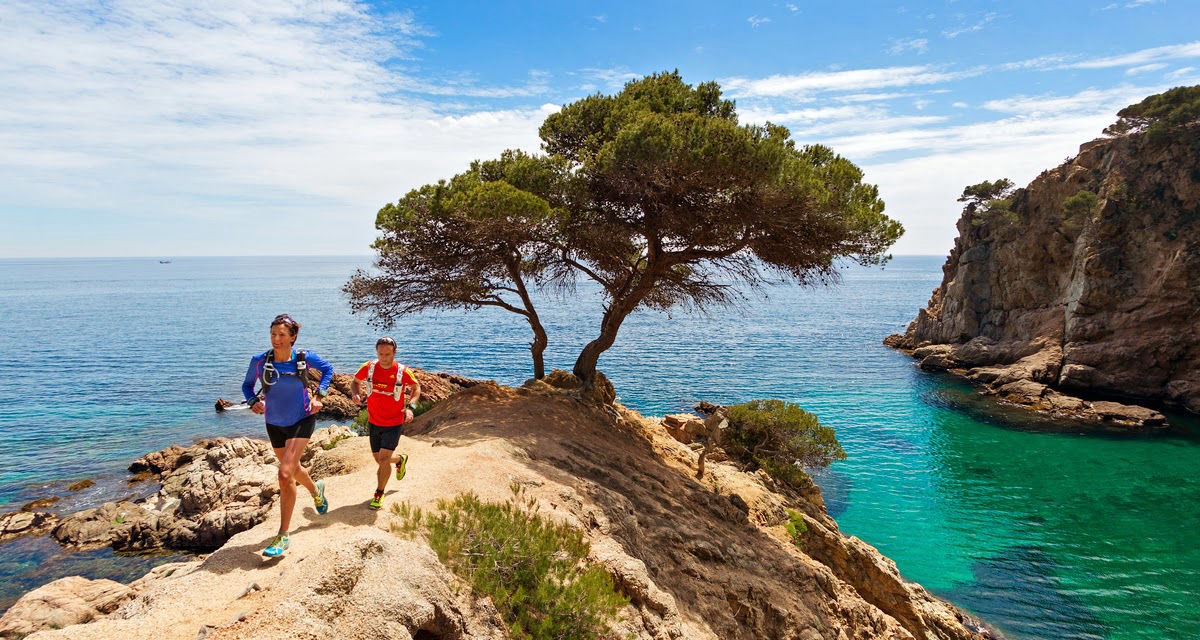Food during a multiday running vacation
FAQs, Costa Brava, Runner Holidays

Runners taking in part in our Running Costa Brava event.
Nutrition during a running vacation is frequently overlooked. How you feel is mostly affected by good training, along with right replenishment of glycogen stores.
Maintaining energy reserves and substrates is crucial so that, at the time of the run, we get the desired results depending on the intensity and length of the activity we engage in.
If we run out of substrate while making a sustained effort, we won't be able to do anything because our body won't comply with the demands.
Therefore, it is crucial to understand what to consume when engaging in long-term sports. The ability to consume food and beverages during breaks may have a significant impact on performance, and at these times, replenishing your body's supply of minerals and carbohydrates will be of the utmost importance.
Water during the run.
The loss of water in the body, on the other hand, results in a decline in physical performance; for this reason, it is always advised to drink fluids throughout the running vacation, even before we feel thirsty. 500 ml to 1 liter of liquid should be consumed every hour, as more than that can be uncomfortable. This volume also needs to be broken up and ingested in little doses every 15 to 20 minutes.
When the temperature is high and there is a substantial loss of water and mineral salts, the situation is different. Mineral drinks must be administered promptly in these circumstances to prevent a decline in performance or muscular spasms.
The dip in blood sugar also signals a state of continual exhaustion that makes it difficult for us to continue performing, and the same holds true if we lose a lot of mineral salts.
Nothing works better for this than consuming liquids that also contain electrolytes and carbs, or mixing water with salt and glucose sources.
Eating during the running.
Eating and drinking during the effort will not only help you avoid meltdown, but it will also improve your performance, help your body not feel so stressed, and favor recovery after the running vacation.
In principle, at the start, if the athlete has followed the correct guidelines, he will have a sufficient muscle glycogen reserve for the day of the run, that is, he can eat normally.
There are some general guidelines for eating before the running vacation:
This isn't an issue. We provide freedom, which means that everyone is free to run at their own speed without feeling rushed or stressed. It will be our responsibility to adjust to each individual's rhythms.
Food for after an multiday running vacation.
The athlete usually feels hungry enough to eat the first post-run meal about an hour after the run. It is best to quench thirst beforehand by drinking small amounts of liquid (fruit juices, mineral waters, hot tea).
The first meal after a run must meet two main criteria: it must compensate for the losses caused by muscular activity on the one hand, and it must quickly synthesize muscle glycogen on the other.
You must replace the proteins and vitamins lost as a result of the run's rigors. You must also replace the fluid and minerals lost through sweat.>
The catabolic metabolism changes to an anabolic one in the post-run phase, especially in the first few hours, with synthesis processes taking precedence.
The body is especially capable of absorbing substances at this time. It is possible to take advantage of this situation by eating a meal that contains all of the substances used in the run in the proper proportions.
The following criteria must be considered in this regard:
To begin with, in order to ensure adequate and necessary replenishment of depleted hepatic and muscular reserves, the consumption of carbohydrates should begin as soon as possible, preferably at the end of the exercise. As a result, it is best to consume foods high in easily digestible carbohydrates, such as brown rice or pasta, or, in hot weather, fruit nectar, sweet infusions, or puddings.
If the diet is high in hydrocarbons, 100% of what is used is recovered in 24 hours. Muscle loading, on the other hand, is slower with a standard CH diet (50 percent in 5 days).
Following that, a small portion of high-protein, low-fat foods should be consumed. Athletes who prefer not to consume meat can meet their nutritional needs with fresh cheeses, ricotta, eggs, or legumes.
We recommend fresh fruit (oranges, grapefruit, bananas, etc.) or a fresh fruit salad (never canned fruit) mixed with yogurt or fresh cheese for dessert.
Drink about half a liter of fruit juice (apple juice, orange juice, etc.) after the meal, either pure or mixed with water.
Later drinks should be consumed a few hours after this meal to avoid overfilling the stomach and diluting the gastric juices.
In summary, the following are the key points in the recovery phase:
-Consume simple sugars in the first few hours (0.7 g of glucose or sucrose per Kg of weight or 50 g of carbohydrates).
-To counteract acidosis, consume alkaline foods and beverages.
